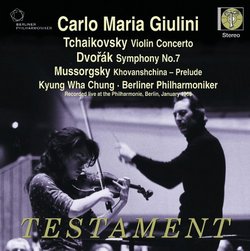Kyung Wha Chung: Tchaikovsky violin Concerto in Berlin
Violin MD | USA | 02/14/2010
(5 out of 5 stars)
"This latest release on Testament is most welcome as Kyung Wha Chung has not released a recording since her acclaimed Brahms Violin Concerto with the Wiener Philharmoniker and Simon Rattle from 2001 on EMI. This Tchaikovsky recording was made in 1973 during Chung's live concert with the Berlin Philharmonic and Carlo Maria Giulini.
The recording possesses the charged anticipation of attending a Kyung Wha Chung live performance with the direct passion and abandon with which she plays all music. The spontaneity and combustive tension and vibrance of Chung's solo line is beautifully and surprisingly fused with the unmistakable Berlin Philharmonic 'sound' that was such a constant of the Karajan era - sonic perfection, power, and propulsion with a depth and full 'wholeness' of sound that would evolve into a different sound-world with Abbado and Rattle.
The first movement is pure excitement as Chung shares a dialogue with the Philharmonic such that she insists on rubato and a fiery, volatile argument that is at odds with the solid, grand masonic-like character of the masculine Berlin Philharmonic. Chung ultimately 'convinces' or wins the musical argument with the orchestra to sing the concerto her way so that all the musical statements are not presented with strict in-tempo timing and chorale-like grandeur. The soloist and the orchestra therefore evolve towards each other in the musical dialogue that is allowed to beautifully unfold by the eminent Giulini.
The second movement Canzonetta is a beautiful love-song presented by the harmonious union of soloist and orchestra with long arching and singing lines that are shared and breathed in an incredible union. The melancholic and wistful statements of this movement are intimately expressed without any sense of ingenuity or 'programmed' effect. Chung's vibrato, portamento, and finger-slides are most beautiful as are the hushed choruses from the wind and string sections.
The finale is balletic and explosive in its athletic velocity, propulsive attack, bite and sense of real dialogue between orchestra and violinist. This, again, is a hallmark feature of a Kyung Wha Chung performance where she takes risks that offer the audience a privileged opportunity to hear a real and riveting performance. At times, the soloist and orchestra 'circle one another' as if in a gladiator arena whereas in other moments the protagonists fly together in synchronized athleticism and grace.
The recording is beautifully engineered despite the live concert setting such that the violin is forward but not overly so; the chamber-music dialogue is exceptionally well-captured and real. This live recording from 1973 in the Berlin Philharmonie is a gift for listeners nearly 36 years later who may now simultaneously enjoy a live concert and new recording from this much-loved violinist."


 Track Listings (4) - Disc #1
Track Listings (4) - Disc #1